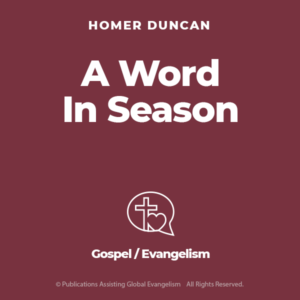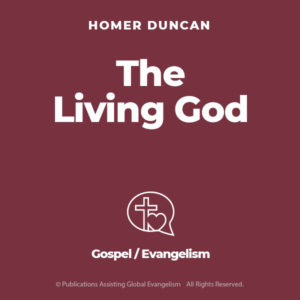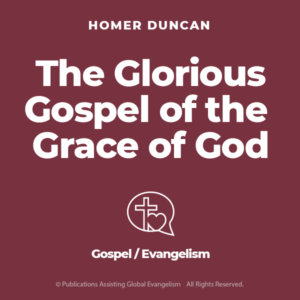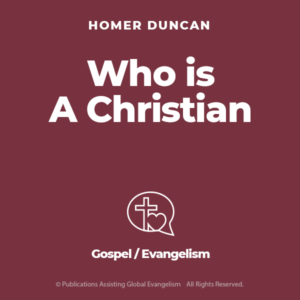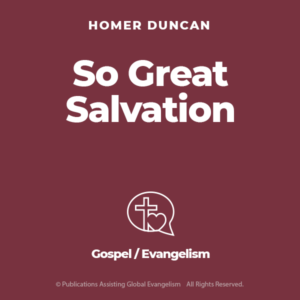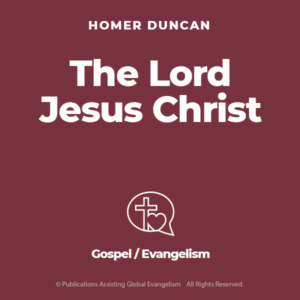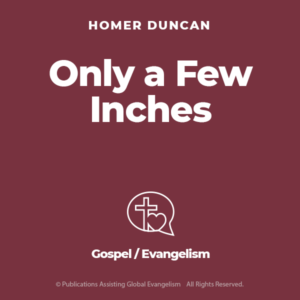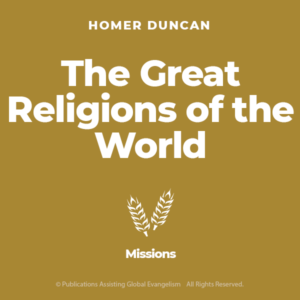Gospel/Evangelism
The Precious Blood of Christ
By Homer Duncan
Missionary Crusader
“Oh! precious is the flow that makes me white as snow; No other fount I know, nothing but the blood of Jesus.”
– Robert Lowry
Even a cursory reading of the Old Testament reveals that literally rivers of blood flowed from all of the animal sacrifices that were offered. On one day, when Solomon’s
Temple was dedicated, 22,000 oxen and 120,000 sheep were killed. Any person who has seen one cow or bull slaughtered, knows that rivers of blood flowed that day.
But, all of the animal sacrifices and all of the rivers of blood that flowed amounted to absolutely nothing except as they pointed forward to THE BLOOD OF THE LAMB that was shed on Calvary’s Cross.
We are redeemed by the blood of Christ; we have forgiveness of sins through the blood of Christ; we are cleansed by the blood of Christ; we are sanctified by the blood of Christ; we are made near to God by the blood of Christ; we have made our peace with God through the blood of Christ; we have boldness to come into the very presence of God through the blood of Christ, and we overcome Satan through the precious blood of Christ.
Why was it necessary for all of this blood to be shed in the old dispensation? Why was it necessary for the Lamb of God to shed His blood on the Cross? I share with you 15 reasons why this was necessary.
I. THE BLOOD OF CHRIST IS THE ONLY BASIS FOR OUR ACCEPTANCE WITH GOD
This great truth is taught throughout all of the Holy Scriptures starting with the book of Genesis. Both Cain and Abel brought an offering to God. Both men desired to please God. Cain brought the fruit of the ground which had been cursed. God rejected his offering. Abel brought the firstlings of his flock; God accepted his offering (Gen. 4:3,4).
This principle holds true today. God rejects the natural man with all of his attainments, and demands a blood sacrifice. A blood-bought religion is offensive to the natural man. Modernists have cut the songs about the blood out of their songbooks. They call the blood atonement “slaughterhouse religion” or the “religion of the shambles.” In her book, SCIENCE AND HEALTH, Mrs. Mary Patterson-Eddy-Baker-Glover-Fry states, “The material blood of Jesus was no more efficacious to cleanse from sin when it was shed upon the accursed tree,’ than when it was flowing in his veins as he went daily about his Father’s business” (p.25).
It is to be regretted that some noted Bible teachers at the present time either deny and ridicule the blood of Christ or minimize its importance.
II. WE HAVE ACCESS INTO THE PRESENCE OF GOD THROUGH THE BLOOD OF CHRIST
“Having, therefore, brethren, boldness to enter the holiest by the blood of Jesus” (Heb. 10:19). In the Old Testament dispensation only the High Priest could enter the Most Holy Place, and that once a year on the day of Atonement. When Jesus Christ died on the Cross, the veil of the Temple was rent in twain, thus signifying that the way into the Most Holy Place is now open to the weakest and most unworthy child of God. We come into the presence of God not on the basis of our own worth or merit, but on the basis of the blood of Christ.
“Nothing in my hand I bring, simply to thy Cross, I cling.”
“Just as I am without one plea, but that thy blood was shed for me, and that Thou bidd’st me come to Thee, O Lamb of God I come.”
III. THE BLOOD OF CHRIST IS THE ONLY PRICE ACCEPTABLE TO GOD FOR OUR REDEMPTION
The Biblical doctrine of redemption is clearly set forth in such verses as:
“Being justified freely by His grace through the redemption that is in Christ Jesus” (Rom. 3:24).
“In whom we have redemption through His blood, the forgiveness of sins, according to the riches of His grace” (Eph. 1:7).
“Forasmuch as you know that you were not redeemed with corruptible things, as silver and gold…but with the precious blood of Christ, as of a lamb without blemish and without spot” (1 Pet. 1:18,19).
“In whom we have redemption through His blood, even the forgiveness of sins” (Col. 1:14).
“Take heed therefore unto yourselves, and to all the flock, over which the Holy Ghost has made you overseers, to feed the church of God, which He has purchased with His own blood” (Acts 20:28).
“And they sung a new song, saying, Thou art worthy to take the book, and to open the seals thereof: for You were slain, and have redeemed us to God by Your blood out of every kindred, and tongue, and people and nation” (Rev. 5:9).
The doctrine of redemption is best stated for us in the note on Romans 3:24 in the New Scofield Reference Bible, and is printed by permission of Oxford University Press.
“Redemption’ means to deliver by paying a price. The work of Christ fulfilling the O.T. types and prophecies of redemption is set forth in three principal Greek words: (1)
Agorazo, to buy in the market. Man is viewed as a slave ‘sold under sin’ (Rom. 7:14) and under the sentence of death (Ezek. 18:4; John 3:18,19; Rom. 6:23) but subject to redemption by the purchase price of the blood of the Redeemer (1 Cor. 6:20; 7:23; 2 Pet. 2:1; Rev. 5:9; 14:3,4). (2) Exagorazo, to buy out of the market, i.e., to purchase and remove from further sale (Gal. 3:13; 4:5; Eph. 5:16; Col. 4:5), speaking of the finalilty of the work of redemption. And (3) lutroo, to loose or set free (Luke 24:21; Titus 2:14; 1 Pet. 1:18). Redemption is by sacrifice and by power.”
The story is told of an African American girl who was (being auctioned in the days before the Civil War. The bidding went higher and higher, but no matter how high the bidding went, a gentleman from the North raised the bid, and finally the girl was his.
The girl fell at his feet and cried, “O sir, do not take me away from my family and loved ones.” He said, “Girl, stand to your feet. I have bought you to give you your freedom.”
The girl fell again at his feet and said, O Sir, “I will be your slave forever.”
When the sinner realizes he has been redeemed by the precious blood of Christ, he cries, “Love so amazing, so divine, demands my soul, my life, my all.”
IV. THE BLOOD OF CHRIST IS THE BASIS FOR THE FORGIVENESS OF SINS
“For this is the blood of the new testament, which is shed for many for the remission of sins” (Matt. 26:28).
“And almost all things are by the law purged with blood; and without the shedding of blood is no remission” (Heb. 9:22). (Also, see Ephesians 1:7).
What a wonderful thing to have all of our sins forgiven! The Bible says, “Every transgression and disobedience received a just recompense of reward” (Heb. 2:3). That means apart from the grace of God and the shed blood of Christ, you and I would have to answer for every sin we ever committed. We will have to answer for every lie we ever told, for every thing we ever stole, for every curse word we ever uttered, for every idle word we ever spoke, and for every evil thought we ever had. If you say or think this does not apply to you, the first sin you need to repent of is the sin of self-righteousness. As Christians ALL of our sins are forgiven the very moment we believe (exercising saving faith) in Christ.
The truth expressed in 1 John 1:9 is the wonderful provision God has made for us to keep the record clean.
V. “THE BLOOD OF JESUS CHRIST, GOD’S SON, CLEANSES US FROM ALL SIN” (1 JOHN 1:7)
The doctrines of forgiveness of sins, and the cleansing from all sin are closely related but distinct from each other. Other great verses on the cleansing power of the blood of Christ are:
“Unto Him who loved us, and washed us from our sins in His own blood” (Rev. 1:5b).
“These are they which came out of great tribulation, and have washed their robes, and made them white in the blood of the Lamb” (Rev. 7:14b).
The blood of Christ can take the fallen woman and make her as pure as a drift of fallen snow; it can turn the thief into an honest man; it can make the drunkard sober.
David knew the cleansing power of the blood of Christ. After his twofold sin of adultery, and of having Uriah put to death he cried, “Wash me thoroughly from my iniquity, and cleanse me from my sin” (Ps. 51:2). And, “Purge me with hyssop and I shall be clean: wash me and I shall be whiter than snow” (v.7).
The words of this Psalm inspired James Nicholson to write:
“Lord Jesus, I long to be perfectly whole;
I want Thee for ever to live in my soul;
Break down every idol, cast out every foe;
Now wash me, and I shall be whiter than snow.”
The wonderful truth of the cleansing power of the blood of Christ inspired William Coper to write:
“There is a fountain filled with blood
Drawn from Immanuel’s veins;
And sinners, plunged beneath that flood,
Lose all their guilty stains.
The dying thief rejoiced to see
That fountain in his day;
And there may I, though vile as he,
Wash all my sins away:
Dear dying Lamb, Thy precious blood
Shall never lose its power,
Till all the ransomed Church of God
Be saved to sin no more:
E’er since by faith I saw that stream
Thy flowing wounds supply,
Redeeming love has been my theme,
And shall be till I die:
Then in a nobler sweeter song,
I’ll sing thy power to save,
When this poor lisping, stammering tongue
Lies silent in the grave.”
Charles G. Finney, the famous evangelist, was preaching in a large Presbyterian church in Detroit, Michigan. One night before the service one of the city’s well-known gamblers approached him and said he would like to talk to him after the service. Mr. Finney agreed to do this. Some of the elders of the church approached Finney and asked him what the gambler wanted. When Finney told them he had promised to talk with the man after the service, the elders told him he dared not do so, for the man had a reputation of being one of the most wicked men in the city. Finney replied, “I have given him my word and I shall keep it.”
That night Finney preached on the “Cleansing Power of the Blood of Christ.” After the service he left with the gambler as he had promised to do. When they turned into a dark alley, Finney began to have some misgivings about his decision. When they entered the gambler’s office, he pulled a revolver from his pocket and showed Finney the notches on the barrel, and told him he had killed four men with the gun. Then he asked, “Mr. Finney, is there any hope for a man like me?” Finney paused before replying, and then said, “The Bible says, ‘the blood of Jesus Christ, God’s Son, cleanses us from all sin.”
Then the gambler said, “Mr. Finney, I am a wealthy man. I make my money by operating a saloon and a gambling den. We get the customers drunk and then take their money from them in one way or another. Mr. Finney, is there any hope for a man like me?”
Once again Finney paused before replying, and then said, “The Bible says, “The blood of Jesus Christ, God’s Son, cleanses us from all sin.”
Then the man said, “I live across the street in a lovely home. Several years ago I deceived my wife and got her to marry me by telling her I was a successful business man. Soon a little daughter was born into our home. When she was ten years old I came home drunk one night, and slammed her against a hot stove. She will wear the scar on her arm to her grave. Mr. Finney, is there any hope for a man like me?”
Finney said, “Your record is a dark one indeed, but the Bible says, ‘The blood of Jesus Christ God’s Son cleanses us from all sin.”
When Finney left the gambler knelt on the floor, poured out his heart in repentance before God, and received Jesus Christ as his Savior and Lord. He then went into the saloon and cried, “Everybody out.” The bartender tried to reason with him and said, “Boss, we are doing a big business.” But his arguments were to no avail.
When everyone was out, the gambler pulled a leg off of a table and began to smash everything in the saloon, liquor and all. He then went to his home across the street. His wife and daughter thought he had come home drunk again, but he told them, “God has given you a new hus- band and father. I have been saved.”
After his conversion the gambler became a strong, steadfast church member and faithfully served the Lord in the city of Detroit for many years.
Redeemed-how I love to proclaim it!
Redeemed by the blood of the Lamb; Redeemed through His infinite mercy,
His child and forever, I am.
– Fanny Crosby
VI. BECAUSE OF THE SHED BLOOD OF CHRIST ALMIGHTY GOD, HIMSELF, DECLARES REPENTANT SINNERS TO BE RIGHTEOUS.
The Bible teaches we are justified by faith (Rom. 3:28; 5:1).
It teaches we are justified by grace (Rom. 3:24; Titus 3:7).
It teaches we are justified by works (James 2:21, 24, 25) (from the human standpoint).
It teaches we are justified by blood. “Much more then, being now justified by His blood, we shall be saved from wrath through Him” (Rom. 5:9).
“Justify” means “to declare righteous,” not “to make righteous.” God declares us to be righteous, not on the basis of who we are, or on the basis of what we have done, but on the basis of what Christ has done for us in His death and resurrection.
When Adam and Eve sinned against God in the Garden of Eden, and became aware of their nakedness, they sought to clothe themselves with fig leaves. Such clothing was acceptable to God; He clothed them with the skins of animals (Gen. 3:21). The blood of the animals had to be shed in order to provide clothing for them. This is the first indication of the shedding of blood in the Bible.
What a wonderful lesson we can learn from this account! Like Adam and Eve, unregenerate man seeks to clothe himself with a covering of his own making. He thinks he can become acceptable to God by his own righteousness, but the Bible tells us that our righteousness (not our sins and our wickedness, but our righteousness) is as filthy rags in the sight of God (Isa. 64:6). We need to be clothed upon with the perfect righteousness of Christ.
The experience of the Apostle Paul perfectly illustrates what the Bible teaches. As a zealous, law abiding Jew, Paul was resting in his own goodness and righteousness, but after he met Christ on the Damascus road, he said, “But what things were gain to me, I counted loss for Christ, yea, doubtless, and I count all things but loss for the excellency of the knowledge of Christ Jesus my Lord: for whom I have suffered the loss of all things, and do count them but refuse, that I may win Christ, and be found in Him, not having my own righteousness, which is of the law, but that which is through the faith of Christ, the righeousness which is of God by faith” (Phil. 3:7-9).
At the marriage of the Lamb, the Church will be arrayed in linen, clean and white: for fine linen is the righteousness of the saints (Rev. 19:8).
May I ask you, in whose righteousness are you trusting? Are you depending on your own goodness and religious activities for your salvation, or are you depending on the perfect righteousness of Christ?
VII. WE OVERCOME SATAN THROUGH THE BLOOD OF CHRIST.
“And they overcame him by the blood of the Lamb…” (Rev. 12:11). Every child of God, who has not been lulled to sleep by Satan (1 John 5:19) knows what it is to be attacked by Satan. He will torment us like a cat playing with a mouse, if we will let him. We must rebuke him in the Name of Christ. We must resist him. We must plead the blood of Christ over our hearts, our homes and every area of our lives.
VIII. WE ARE MADE NEAR TO GOD THROUGH THE BLOOD OF CHRIST.
“Therefore remember that you…were without Christ, being aliens from the commonwealth of Israel and strangers from the covenant of promise, having no hope and without God in the world. But now in Christ Jesus you who were once far off have been made near by the blood of Christ” (Eph. 2:11-13).
IX. THE BLOOD OF CHRIST IS THE BASIS OF OUR RECONCILIATION.
“For if, when we were enemies, we were reconciled to God by the death of His Son, much more, being reconciled, we shall be saved by His life” (Rom. 5:10). “God was in Christ reconciling the world unto Himself” (2 Cor. 5:19). “For it pleased the Father that in Him should all fulness dwell, and by Him to reconcile all things to Himself, by Him, whether things on earth or things in heaven, having made peace through the blood of His cross” (Col. 1:19,20).
X. ANIMAL BLOOD IS THE NECESSARY BASIS OF THE OLD COVENANT.
“And Moses took half of the blood and put it in basins; and half of the blood he sprinkled on the altar” (Ex. 24:6). “And Moses took the blood, and sprinkled it on the people, and said, Behold the blood of the covenant… (Ex. 24:8). “For the life of the flesh is in the blood: and I have given it to you upon the altar to make an atonement for your souls: for it is the blood that makes an atonement for the soul” (Lev. 17:11).
“Whereupon, neither the first testament was dedicated without blood… (Moses) took the blood of calves and goats…saying this is the blood of the covenant which God has commanded you to keep…and almost all things are by the law purged with blood, and without the shedding of blood there is no remission” (Hebrews 9:18-22).
XI.THE BLOOD OF CHRIST IS THE BASIS OF THE NEW COVENANT.
“And as they were eating, Jesus took bread, and blessed it, and brake it, and gave it to the disciples, and said, Take, eat; this is my body. And He took the cup and gave thanks, and gave it to them saying, Drink all of it; For this is my blood of the new testament, which is shed for many for the remission of sins” (Matt. 26:26-28).
“But Christ being a high priest of good things to come, by a greater and more perfect tabernacle, not made with hands, that is to say, not of this building, neither by the blood of goats and calves, but by His own blood he entered once into the holy place, having obtained eternal redemption for us. For if the blood of bulls and goats, and the ashes of an heifer sprinkling the unclean, sanctifieth to the purifying of the flesh, how much more shall the blood of Christ, who through the eternal Spirit offered Himself without spot to God, purge your conscience from dead works to serve the living God? And for this cause He is the mediator of the new testament (covenant), that by means of death, for the redemption of the transgressions that were under the first testament, they who are called might receive the promise of eternal inheritance” (Heb. 9:11-15).
In giving instruction about the Lord’s Table, the Apostle Paul said:
“After the same manner also He took the cup, when He had supped, saying, this cup is the new testament in my blood: this do ye, as often as you drink it, in remembrance of me. For as often as you eat this bread, and drink this cup, you do show the Lord’s death till He come. Wherefore whosoever shall eat this bread, and drink this cup of the Lord unworthily, shall be guilty of the body and blood of the Lord” (1 Cor. 11:25,27).
XII. DRINKING THE BLOOD OF CHRIST
In His discourse on “The Bread of Life” the Lord Jesus spoke these words:
“I am the living bread which came down from heaven: If any man eat of this bread, he shall live forever: and the bread that I will give is my flesh, which I will give for the life of the world.”
The Jews therefore strove among themselves, saying, How can this man give us his flesh to eat. Then Jesus said to them,
“Verily, verily, I say unto you, Except you eat the flesh of the Son of man, and drink His blood, you have no life in you. Whoso eats my flesh, and drinks my blood, has eternal life; and I will raise him up at the last day. For my flesh is meat indeed, and my blood is drink indeed. He that eats my flesh, and drinks my blood dwells in me and I in him” (John 6:51-56).
Since this is confessedly a difficult passage of Scripture, I am grateful for the help of the noted Bible expositor, Arthur W. Pink. He writes as follows:
‘”Then Jesus said unto them, Verily, verily, I say I unto you, except you eat the flesh of the Son of man, and drink His blood, you have no life in you’ (v.53). This verse and the two that follow contain an amplification of what He said in v.51. He was shortly to offer Himself as a substitutionary victim, an expiatory sacrifice, in the room of and in order to secure the salvation of both Jews and Gentiles. This sacrificial death must be appropriated, received into the heart by faith, if men are to be saved thereby. Except men ‘eat the flesh’ and ‘drink the blood’ of Christ, they have ‘no life’ in them. For a man to have ‘no life’ in him means that he continues in spiritual death: in that state of condemnation, moral pollu- tion, and hopeless wretchedness into which sin has brought him.
“Observe the Son of man is speaking of Himself. How could He have suffered death if He had not become incarnate? The incarnation was in order to His death. This links the mysteries of Bethlehem and Calvary; the incarnation and the Cross! The one was in order to the other. He came from heaven to earth in order to die: but now once in the end of the age hath He appeared to put away sin by the sacrifice of Himself”” (Heb. 9:26).
“Except you eat the flesh of the Son of man, and drink His blood, you have no life in you’ (v.53). Difficult as this language first appears, it is really blessedly simple. It is not a dead Christ which the sinner is to feed upon, but the death of One who is now alive forever more. His death is mine, when appropriated by faith; and this appropriated, it becomes life in me. The figure of eating looks back to Genesis three. Man died (spiritually) by ‘eating’ of the forbidden fruit, and he is made alive (spiritually) by an act of eating!
“Whoso eats my flesh, and drinks my blood, has eternal life; and I will raise him up at the last day’ (v.54)…I must appropriate Him, make Him mine by an act of faith. This act of receiving Christ is done once for all. I cannot receive him the second time, for He never leaves me! But, having received Him to the saving of my soul, I now feed upon Him constantly, daily, as the Food of my soul. Exodus 12 supplies us with an illustration. First, the Israelite was to apply the shed blood of the slain lamb. Then, as protected by the blood, he was to feed upon the lamb itself.
“Whoso eats my flesh, and drinks my blood, has eternal life; and I will raise him up at the last day’ (v.54). This confirms our interpretation of the previous verse. If we compare it with verse 47 it will seen at once that ‘eating’ is equivalent to believing.’ Each of these are evidences of eternal life, already in possession of the one thus engaged.
“This passage in John 6 is a favorite one with Ritualists, who understand it to refer to the Lord’s Supper. But this is certainly a mistake, for the following reasons: First, the Lord’s Supper had not been instituted when Christ delivered this discourse. Second, Christ was here addressing Himself to unbelievers, and the Lord’s Supper is for saints, not unregenerate sinners. Third, the eating and drinking spoken of here are in order to salvation; the eating and drinking at the Lord’s Table are for those who have been saved.
“He that eats my flesh and drinks My blood, dwells in Me, and I in him’ (v.56). In this, and the following verse, Christ states some of the blessed effects of eating. The first effect is that the sinner is brought into vital union with Christ, and enjoys the most intimate fellowship with Him. Dwelling in Christ has reference to communion. The language clearly implies that Christ would rise from the dead, for only as risen could He dwell in the believer, and the believer in Him. It is with Christ risen that they who feed on Him are identified. The Scriptures here, for the first time, speak of union with our blessed Lord” (Taken from EXPOSITION OF THE GOSPEL OF JOHN by Arthur W. Pink, Vol. II, pp. 89-92).
XIII. OUR CONSCIENCES ARE PURGED BY THE BLOOD OF CHRIST.
“How much more shall the blood of Christ, who through the eternal Spirit offered Himself to God, purge your conscience from dead works to serve the living God?” (Heb. 9:14). Many people who are dead in trespasses and sins (Eph. 2:1) think they can be saved by their good works, but spiritually dead men can produce dead works, and dead works cannot save.
XIV. IN THE OLD TESTAMENT THE BLOOD OF ANIMALS COVERED OUR SINS; IN THE NEW TESTAMENT CHRIST, HIMSELF, TAKES AWAY OUR SINS (JOHN 1:29)
In the Old Testment the word “atonement” (Hebrew “Kaphar”) is found 75 times.. It means to cover sins. The word “atonement” is not found in the New Testament. Someone may call to my attention Romans 5:11. In this instance the word should have been translated “reconciliation” instead of “atonement.” Sound Bible doctrine demands that it must be translated this way.
XV. THE LORD JESUS CHRIST, HIMSELF, IS THE PROPITIATION FOR OUR SINS
In the Old Testament the blood of animals was sprinkled on the Mercy Seat, which was above the Ark of the Covenant. In the New Testament, Christ Himself is the Mercy Seat. “And He is the propitiation (Mercy Seat) for our sins: and not for ours only, but for the sins of the whole world” (1 John 2:2). “Herein is love, not that we loved God, but that He loved us, and sent His Son to be the propitiation (Mercy Seat) for our sins” (1 John 4:10). “Being justified free by His grace through the redemption that is in Christ Jesus: Whom God hath sent forth to be a propitiation through faith in His blood, to declare His righteousness for the remission of sins that are past, through the forbearance of God” (Rom. 3:24, 25). The blood of Christ turned the Judgment Seat into a Mercy Seat.
“Alas! and did my Savior bleed?
And did my Sovereign die?
Would He devote that sacred head
For such a worm as I?
– Isaac Watts
THE PASSOVER LAMB
On the night the Children of Israel went out of the land of Egypt, God gave Moses these instructions. “Speak to the congregation of Israel, saying, in the tenth day of this month they shall take to them every man a lamb, according to the house of their fathers, a lamb for an house…your lamb shall be without blemish, a male of the first year…and you shall keep it up until the fourteenth day of the month: and the whole assembly of the congregation of Israel shall kill it in the evening. And they shall take the blood, and strike it on the two side posts and on the upper door post of the houses, wherein they shall eat it. And they shall eat the flesh in that night, roast with fire, and unleavened bread; and with bitter herbs shall they eat it” (Ex. 12:3-8).
“And the blood shall be to you for a token upon the houses where you are: and when I see the blood, I will pass over you” (Ex. 12:13).
There is far more in this passage than we can discuss at this time, but notice seven things:
1. A lamb was to be taken.
2. It must be a perfect lamb.
3. It was to be kept up from the tenth until the fourteenth day of the month.
4. It must be killed.
5. The blood must be applied.
6. The lamb was to be eaten.
7. How it was to be eaten.
SEVEN LESSONS TO BE LEARNED FROM THE PASSOVER LAMB
1. The Passover Lamb is a type of Christ. “Christ our passover is sacrificed for us” (1 Cor. 5:7). When John the Baptist saw Jesus coming to him, he said, “Behold the Lamb of God which takes away the sin of the world”? (John 1:29). The Lord Jesus is referred to as “The Lambº over 20 times in the book of Revelation.
2. The Lord Jesus is the Lamb without spot and without blemish. No man, past or present, has ever been able to detect a flaw in His character. Robert Ingersoll, the noted infidel, wrote a book on THE MISTAKES OF MOSES, but no man has ever written a book on the mistakes of Christ. When Pilate examined Christ he said, “I find no fault in Him” (John 19:6). Pilate’s wife sent unto him and said, “Have nothing to do with that just man” (Matt. 27:19). Pilate said, “I am innocent of the blood of this just person” (Matt. 27:24). Even the thief who hung on the cross said, “This man has done nothing amiss” (Luke 23:41), Judas Iscariot said, “I have sinned in that I have betrayed innocent blood” (Matt. 27:4).
3. The lamb was kept from the 10th to the 14th day of the month to see if some blemish would be found in it. Though the Lord Jesus was tempted and tested in all points like as we are, he was found to be without sin (Heb. 4:15). Theologians argue as to whether or not Christ could have sinned. God did not test Him, and did not permit Satan to tempt Him to see if He would sin, but to demonstrate that He could not sin. This doctrine is called the doctrine of the impeccability of Christ. It can be argued that Jesus Christ was a man as well as being God, and that as a man he could have sinned. But, take a copper wire which can be bent and twisted, and weld the wire into a grove of a steel bar, then it cannot be bent or twisted.
Many years ago the New York-New Haven Railroad built a high suspension bridge across a deep canyon in the state of Connecticut. When the people who lived in the valley below saw the bridge, it did not appear to be very strong, and they said, “I will never ride a train across that bridge.” This talk came to the ears of the railroad officials, and on the day the bridge was to be dedicated a large crowd gathered for the occasion. Early that morning a giant locomotive rolled out and stopped in the middle of the bridge. Then another locomotive rolled out from the other end of the bridge. The railroad company loaded the bridge with the heaviest rolling stock they had. What werethey doing? Were they testing the bridge to see if it would hold up the weight? No! They knew the bridge would hold up the weight; they wanted to demonstrate to the folks who lived in the valley that the bridge would hold up the weight.
In the same way, God tested Christ not to see if He would sin, but to demonstrate to you and me, “the folks living in the valley below,” that Christ could not sin.
Yes, the One who had no sin (1 John 3:5), who knew no sin (2 Cor. 5:21), who did no sin (1 Peter 2:24), was made to be sin for you and for me that we might be made the righteousness of God in Him” (2 Cor. 5:21).
4. The chosen Lamb, the perfect Lamb, the tested and tried Lamb must be killed. The Lord Jesus Christ is the Lamb of God who takes away the sins of the world (John1:29). He did not die for his own sins, for he had none. He died for your sins, for my sins, for the sins of the whole world (1 John 2:2). The New Testament is filled with the doctrine of the substitutionary death of Christ. He died in our place and stead. He paid our sin debt.
“Jesus paid it all, all to Him I owe; sin had left a crimson stain, He washed it white as snow.” – Mrs. H.M. Hall
“Christ died for our sins according to the Scriptures’ (1 Cor. 15:3). “For Christ has also once suffered for sins, the just for the unjust, that He might bring us to God” (1 Peter 3:18). “Who his own self bare our sins in his own body on the tree, that we, being dead to sins, should live unto righteousness: by whose stripes you were healed”? (1 Peter 2:24). “For He (God) made Him (Christ) to be sin for us, who knew no sin; that we might be made the righteousness of God in Him. (2 Cor. 5:21). The Lamb must be killed; His blood must be shed.
5. The blood must be applied. It availed naught unless it was applied to the door posts of the houses. In the same way the blood of Christ must be applied, by faith, to the door posts of our hearts.
Throughout this entire passage figurative language has been used, but this does not mean we are not dealing with hard, cold facts of reality. The Lord Jesus Christ actually and historically died on the Cross. His blood was literally shed. In a way we do not understand His blood has been put on the Mercy Seat in Heaven. However, the atonement was made on the Cross, and not three days later when His blood was put on the Mercy Seat.
The Holy Spirit is trying to teach us that the blood of Christ is not merely a symbolical thing; He is trying to teach us the blood of Christ must actually, by faith, be appropriated. My dear professing Christian friend, if you know naught of what I speak, you would do well to hearken to the admonition of the Apostle Paul to the Church at Corinth. “Examine yourselves, whether you are in the faith; prove your own selves, how that Jesus Christ is in you, except you be reprobates” (2 Cor. 13:5).
6. The lamb was to be eaten. “And they shall eat the flesh in that night, roast with fire, and unleavened bread; and with bitter herbs shall they eat it” (Ex. 12:8). In His discourse on The Bread of Life, the Lord Jesus made this statement, “Except you eat the flesh of the Son of Man, and drink His blood, you have no life in you” (John 6:53). The Papish doctrine of Transubstantiation (that the elements of the Lord’s Supper are actually changed into the body and blood of Christ) is without Scriptural support. In a very real sense we feed on Christ when we feed on the written Word of God (1 Peter 2:2; Matt. 4:4; Heb. 5:12; Ps. 19:10). But, in another, and in a deeper sense, we feed on Christ when we learn to appropriate His very life as our own. How little most of us know of this.
7. “And thus shall you eat it; with your loins girded, your shoes on your feet, and your staff in your hand; and you shall eat it in haste; it is the LORD’s passover” (Ex. 12:11). Surely this speaks to us of being ready for the Lord’s return.
APPLICATION
My friend, is the blood of Christ precious to you (1 Peter 1:19), or is it just another Bible doctrine? Do you fully realize your salvation depends completely on the death and resurrection of Christ, or are you in any measure depending on your own worth and merit? Do you know the meaning of walking in fellowship with God? Do you “keep short accounts” with God by confessing each sin as soon as it is made known? Do you realize, as a born-again Christian, that the blood of Christ is not only the basis of our forgiveness, but that it is the means of our cleansing (1 John 1:9)?
Are you learning what it means to feed on Christ? Are you waiting for Christ with your loins girded, and your feet shod?
Our loving Heavenly Father has made every provision for us to live triumphantly.

